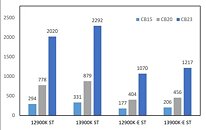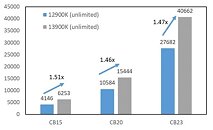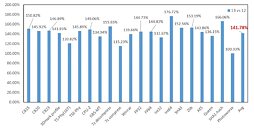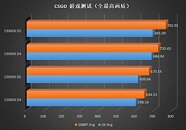- Joined
- Oct 9, 2007
- Messages
- 47,647 (7.44/day)
- Location
- Dublin, Ireland
| System Name | RBMK-1000 |
|---|---|
| Processor | AMD Ryzen 7 5700G |
| Motherboard | Gigabyte B550 AORUS Elite V2 |
| Cooling | DeepCool Gammax L240 V2 |
| Memory | 2x 16GB DDR4-3200 |
| Video Card(s) | Galax RTX 4070 Ti EX |
| Storage | Samsung 990 1TB |
| Display(s) | BenQ 1440p 60 Hz 27-inch |
| Case | Corsair Carbide 100R |
| Audio Device(s) | ASUS SupremeFX S1220A |
| Power Supply | Cooler Master MWE Gold 650W |
| Mouse | ASUS ROG Strix Impact |
| Keyboard | Gamdias Hermes E2 |
| Software | Windows 11 Pro |
An early review of a retail Intel Core i9-13900K "Raptor Lake" 8P+16E processor shows it holding up to the rumored "20-40" claim, the idea that the processor can be up to 20% faster in gaming, and up to 40% faster in productivity, compared to the current i9-12900K. Much of the gaming performance increase is attributed to the higher IPC of the new "Raptor Cove" P-cores, and the much higher boost clocks they run at (up to 5.80 GHz); whereas the multi-threaded performance boost comes from not just the faster P-cores, but a doubling in the E-core count to 16, and improved E-core cache structures, besides higher clock speeds that they run on. For tests that scale across P-cores and E-cores, the i9-13900K behaves like a 24-core/32-thread processor, which is what it is. Among the tests included are CSGO, AIDA64, 7-Zip, WinRAR, Cinebench R15, R20, and R23; and their average, in comparison to the i9-12900K.




View at TechPowerUp Main Site | Source




View at TechPowerUp Main Site | Source









